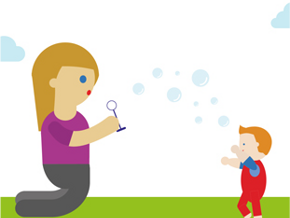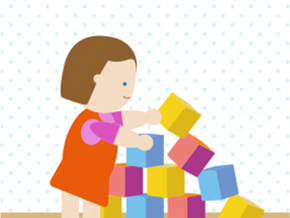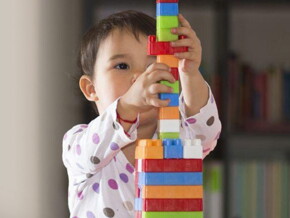
Your toddler has a very strong desire to get things right. When they are unable to get things to go their way, they get very frustrated and act out what toddlers are famous for — tantrums.
A similar behaviour is also evident in babies just before a physical milestone such as crawling. This frustration helps to propel them forward to achieve. Tantrums are a physical outburst of the frustration felt by your toddler when things aren’t going the way they would like them to. Common tantrum behaviours exhibited by toddlers include:
- Stamping the feet
- Screaming and yelling
- Kicking
- Squealing
- Throwing themselves to the floor
- Head banging on the floor or a wall
- Holding their breath until they pass out (now there’s a fun one…not)
- Biting
- Deliberately not eating
- Holding on to poo.
It is important to recognise that a tantrum is normal behavior in your toddler’s development. Tantrums are sometimes split into two types – manipulative tantrums and frustration tantrums.
- Manipulative Tantrums arise out of desires. Your toddler may use manipulative tantrums to get things done their way such as to force you to buy a toy or a lolly. It is best to walk away from this type of tantrum and make it clear that you’re ready to help when your toddler calms down.
- Frustration Tantrums arise because of an inability to express themselves accurately. Sometimes your toddler’s mental and motor skills have progressed more quickly than their ability to communicate. Not being able to express themselves enough for you to understand what they want, leads to a frustration tantrum. It is best not to ignore this tantrum but to help them work whatever it is out. A frustration tantrum may also arise if your toddler is trying to do something they can’t achieve. For example, your toddler may be trying to climb higher than what they can. You can offer your support and a hand to help your toddler in this situation.
Regardless of which type it is though, it is important to help your toddler understand and learn what is acceptable behavior and what is not (some adults have never learnt this).
Your toddler has boundless energy and keeps challenging whoever is around until they get the result they want. If they never get it they will stop trying and eventually move onto something else – they have learnt the boundary. If you give in, even once, your toddler will keep going until you break again, so choose your ‘cave-ins’ carefully.
A tantrum indicates that your toddler is gaining a healthy sense of identity and independence. Your response to a tantrum is therefore significant for what your toddler learns about controlling emotions and making acceptable choices. Eventually, they will learn self-control and constructive willpower.
By managing tantrum behavior in a positive way, you will help your toddler come out the other end at 3 years old having learnt valuable character traits.
There are several things that may help you and your toddler survive these challenging years:
- Set sensible expectations and limits of behavior and BE CONSISTENT when enforcing them as your toddler quickly learns you mean what you say when you follow through, but are confused when you don’t;
- It is important that both parents discuss and set the same boundaries to enforce;
- When going on outings, explain to your toddler in simple terms where you are going and what behavior you expect from them. Your toddler likes to know what is happening and what is expected. Keep expectations positive, not negative. For example, we walk when we are inside Jane’s house rather than we don’t run inside Jane’s house. Saying sentences this way helps the brain to program pictures better;
- Help your toddler understand what they can do to help themselves feel better such as looking at a colourful book. Then do it with them so they can experience how it helps them to feel better;
- Try to avoid situations that are likely to result in a tantrum. For example, if your toddler is tired and hungry, that is not the time to take them shopping;
- When a tantrum does occur, respond to it immediately and don’t bring it up again later or wait until daddy gets home! Forgive and move on;
- Let your toddler know that their behavior is not acceptable, rather than ‘they’ are not acceptable. For example, biting Ava was a bad thing to do, rather than saying, you are a bad girl for biting Ava;
- Keep instructions simple and to the point;
- If it is appropriate, ignore some of their behavior or place them in a safe place until they calm down – avoid using the bedroom. This area needs to be a happy place not one of punishment or you will find it a battle to get them to bed at night;
- Time out disciplines usually work best for the toddler over 2 ½ years old. Avoiding situations or distracting and moving them away from the problem works best for the younger toddler (12 months – 36 months);
- Keep focused through this stage of development and remember you are teaching your toddler to learn about self-control, consequences of their actions and acceptable choices;
- Give your toddler consistent messages. For example, if you laugh at an action, they did at home but get angry at the same action when they are out, the message they get is inconsistent and confusing;
- Celebrate what your toddler does right by praising their behavior rather than concentrating on the things that they do wrong;
- Keep the tone and pitch of your voice friendly when you praise their behavior as that is just as important as the words you say.
Some tips on handling tantrums at public places
- Your toddler may get uncomfortable with new surroundings. If they often throw tantrums at public places like shopping centers and give you a hard time, then it is quite possible that they may not like to be out in an unfamiliar place and around unfamiliar people;
- Let your toddler know you are there with them. Be with them all the time. Do not ignore them. Give them a hug or pick them up gently and take a stroll. This calms them down and then you may carry on;
- Always take food and water with you when you go out so that you can feed your toddler if they feel hungry or thirsty at a public place;
- Take your toddler away from the crowd. If your toddler is not settling down you may take them to a quiet place like a restroom or to your car and let them calm down. Reassure them that you are around if they feel afraid;
- Take their favourite toys with you.
If your toddler has major tantrums several times a day or often has very long uncontrollable tantrums, seek professional advice, as there may be an explanation you hadn’t considered.


















